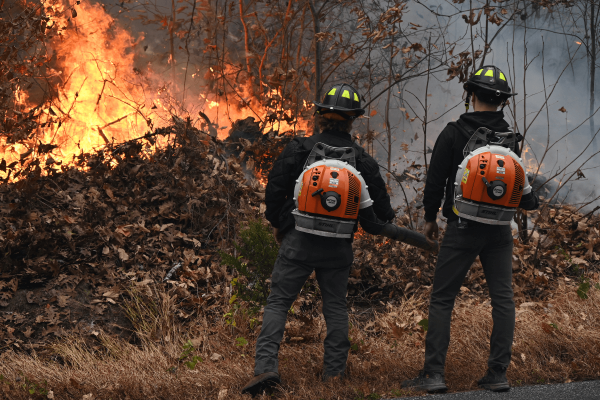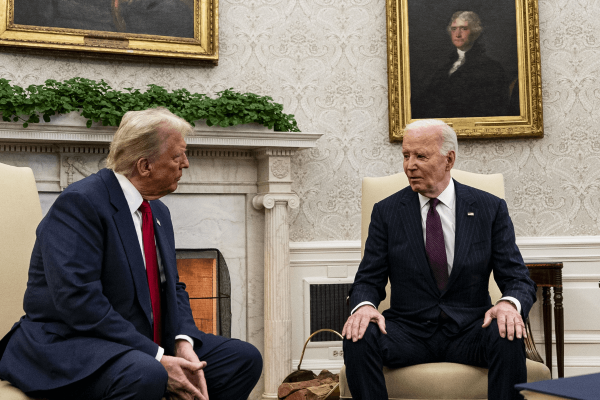I have spent the past few months asking secular and faith-based organizers about how they work together and what their priorities are. As part of my series of interviews about faith and community organizing, I interviewed Rev. Deborah Lee, executive director of Interfaith Movement for Human Integrity, about the impact of interfaith organizing and opportunities for people of faith to act for immigration justice now, particularly with the asylum seekers at the border.
This interview has been lightly edited for clarity and length.
Dani Gabriel, Sojourners: Will you tell me a little bit about Interfaith Movement?
Rev. Deborah Lee, Interfaith Movement for Human Integrity: The Interfaith Movement for Human Integrity is a California-based organization with its roots in the movement and the ministries to support immigrants during Prop 187 in California and in the movements to support low-wage workers in the 90s. In the present day, we're working on bringing out the faith voice around immigrant justice and around ending mass incarceration.
Gabriel: What is the biggest immigration crisis you see right now?
Lee: The biggest immigration crisis is that immigration is being criminalized. We are in an immigration exclusion period. We are in a period of exclusion, not only in the Muslim ban, but in denying people the rights to apply for asylum, which is their national and international right. And then there are people who are already here and who have been living among us who are being banned and excluded from being full members of our society, being able to participate and to live without fear.
So I think that that's the biggest crisis, that we're really living in this period where immigrants are being criminalized, with actual sentences and with actual jail time and with the immigration prisons that we have, over 200 immigration prisons across the country.
We have to really flip the way we're seeing this. Immigrants are bringing and contributing and seeking what we all seek as human beings, seeking some of the very basics in life. The danger right now is this barrier, this border that's being created, not just physically between our country and other countries, but this border in people's hearts. This border of us and them, this border of who can be part of America and who can't be, who could be part of my family who can't be. We're at such a fundamental values level where this is being fought out. We’re in a battle over which values we are going to stake into. Are they values of generosity?
Gabriel: What is unique about interfaith organizing specifically?
Lee: It's about doing organizing in a way that builds beloved community. The other thing about Interfaith Organizing that's special, of course, is that bringing together people of different faiths helps us touch into the depth of different faith traditions. We get to learn about faith traditions that aren't our own. Different faith traditions bring different gifts. When we come together around a particular issue, it's really powerful. What I hear from a lot of politicians, because we take a lot of interfaith delegations to meet with politicians and elected officials and decision-makers, is that they don't get to see faith communities working together a lot. There’s a power in them seeing that we are coming together, that there's something that's very clear and uniting us across our traditions. It’s a powerful message to decision makers to see that despite our different cultures and religions, we share some common principles and values and we're inviting them into that as well.
Gabriel: What do you want faith communities to be considering right now, both in terms of interfaith organizing and in terms of the immigration crisis?
Lee: I would like faith communities to stretch themselves. We are being called to stretch. So much is being tested and contested in our political world and in the world that we're living. Some faith communities are feeling it very directly and some may be insulated from it, but I think our invitation to faith communities is to be willing to take some leaps of faith and to step off the curb. Get out of our comfort zones. These are extraordinary times and we're going to have to push ourselves to respond to these extraordinary times with equal measure. That’s going to mean trying things we haven't done before.
We’re asking people to do three things around immigration right now. Congregations along the border are asking for help from other congregations. They have already opened themselves up to be shelters, with no support to do that. The second thing is we need people to be sponsors. This means providing some housing hospitality and support and an accompaniment team. The third thing we're asking faith communities to do is to really be engaged in changing policy, these policies of exclusion.
There are going to be many more caravans, no matter what happens to this caravan, no matter all the things they tried before, separating the parents from the children, building another wall, a bigger wall. All of that is not going to deter people from having to escape for their lives.
Gabriel: What is one thing everyone can do to help immigrants in this country right now?
Lee: Talk about it. Talk about it and help to dispel the lies. Name the explicit and implicit piece around race that is embedded in these conversations. It's not just about welcoming the stranger. This country was based on racial conquest of indigenous people and then enslavement, racialized enslavement and an economy based on that. We have to be able to see how that's reflected in everything. Also, challenge the legal and illegal framework around immigration. The laws are not neutral.
Everybody can do something, and I have witnessed this. Part of working with a "movement" and a large community of people is that there's so many ways people have stepped up and come up with things that they could do, whether it was writing a letter, telling someone’s story, or helping to raise a first-time donation into someone's bond fund.
There's a role for artists. There's a role for musicians. There's a role for people who can pray with people. There are a 1,000 ways to practice sanctuary. Start with one thing and see what happens. The exodus coming to our border is giving us an opportunity. Are we going to reject this opportunity or are we going to be open to it and to say, "What will I learn from this? How will I become more human by this? How will my faith deepen by this? How will I grow? How will I be challenged by this?"
Got something to say about what you're reading? We value your feedback!






